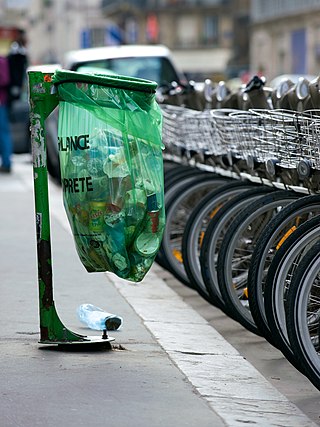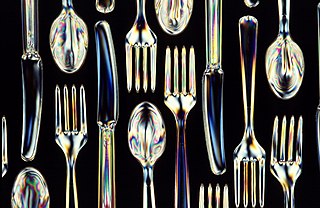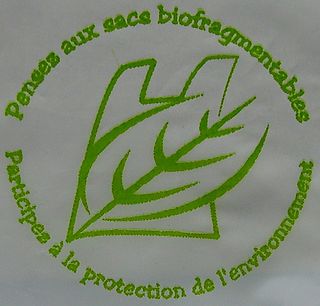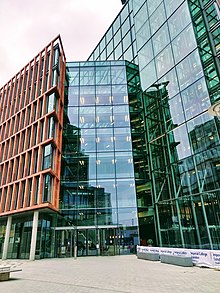
Biodegradation is the breakdown of organic matter by microorganisms, such as bacteria and fungi. It is generally assumed to be a natural process, which differentiates it from composting. Composting is a human-driven process in which biodegradation occurs under a specific set of circumstances.

Glitter is an assortment of flat, small, reflective particles that are precision cut and come in a variety of shapes, sizes, and colors. Glitter particles reflect light at different angles, causing the surface to sparkle or shimmer. Glitter is similar to confetti, sparkles and sequins, but somewhat smaller.

Plastic shopping bags, carrier bags, or plastic grocery bags are a type of plastic bag used as shopping bags and made from various kinds of plastic. In use by consumers worldwide since the 1960s, these bags are sometimes called single-use bags, referring to carrying items from a store to a home. However, it is rare for bags to be worn out after single use and in the past some retailers incentivised customers to reuse 'single use' bags by offering loyalty points to those doing so. Even after they are no longer used for shopping, reuse of these bags for storage or trash is common, and modern plastic shopping bags are increasingly recyclable or compostable - at the Co-op for example. In recent decades, numerous countries have introduced legislation restricting the provision of plastic bags, in a bid to reduce littering and plastic pollution.

A bin bag, rubbish bag, garbage bag, bin liner, trash bag or refuse sack is a disposable bag used to contain solid waste. Many bags are useful to line the insides of waste containers to prevent the insides of the receptacle from becoming coated in waste material. Most bags today are made out of plastic, and are typically black, white, or green in color.

Plastic recycling is the processing of plastic waste into other products. Recycling can reduce dependence on landfill, conserve resources and protect the environment from plastic pollution and greenhouse gas emissions. Recycling rates lag those of other recoverable materials, such as aluminium, glass and paper. From the start of production through to 2015, the world produced some 6.3 billion tonnes of plastic waste, only 9% of which has been recycled, and only ~1% has been recycled more than once. Of the remaining waste, 12% was incinerated and 79% either sent to landfill or lost into the environment as pollution.

Bioplastics are plastic materials produced from renewable biomass sources, such as vegetable fats and oils, corn starch, straw, woodchips, sawdust, recycled food waste, etc. Some bioplastics are obtained by processing directly from natural biopolymers including polysaccharides and proteins, while others are chemically synthesised from sugar derivatives and lipids from either plants or animals, or biologically generated by fermentation of sugars or lipids. In contrast, common plastics, such as fossil-fuel plastics are derived from petroleum or natural gas.
Manuel Rendon is an inventor and engineer who created a U.S. patented formulation for the dynamic disintegration of plastics, the upcycling process for unsorted waste stream and a bio-based copolymer with programmable water solubility. On December 10, 2020, Nestle announced its investment in the company behind this technology.
Polyethylene or polythene film biodegrades naturally, albeit over a long period of time. Methods are available to make it more degradable under certain conditions of sunlight, moisture, oxygen, and composting and enhancement of biodegradation by reducing the hydrophobic polymer and increasing hydrophilic properties.

Biodegradable plastics are plastics that can be decomposed by the action of living organisms, usually microbes, into water, carbon dioxide, and biomass. Biodegradable plastics are commonly produced with renewable raw materials, micro-organisms, petrochemicals, or combinations of all three.

Plasticulture is the practice of using plastic materials in agricultural applications. The plastic materials themselves are often and broadly referred to as "ag plastics". Plasticulture ag plastics include soil fumigation film, irrigation drip tape/tubing, plastic plant packaging cord, nursery pots and bales, but the term is most often used to describe all kinds of plastic plant/soil coverings. Such coverings range from plastic mulch film, row coverings, high and low tunnels (polytunnels), to plastic greenhouses.

A plastic bottle is a bottle constructed from high-density or low density plastic. Plastic bottles are typically used to store liquids such as water, soft drinks, motor oil, cooking oil, medicine, shampoo, milk, ink, etc. They come in a range of sizes, from very small bottles to large carboys. Consumer blow molded containers often have integral handles or are shaped to facilitate grasping.

Sustainable packaging is the development and use of packaging which results in improved sustainability. This involves increased use of life cycle inventory (LCI) and life cycle assessment (LCA) to help guide the use of packaging which reduces the environmental impact and ecological footprint. It includes a look at the whole of the supply chain: from basic function, to marketing, and then through to end of life (LCA) and rebirth. Additionally, an eco-cost to value ratio can be useful The goals are to improve the long term viability and quality of life for humans and the longevity of natural ecosystems. Sustainable packaging must meet the functional and economic needs of the present without compromising the ability of future generations to meet their own needs. Sustainability is not necessarily an end state but is a continuing process of improvement.
'''OXO-degradable''' is a term used by the EU and others which has caused confusion. The specific definitions are found in CEN Technical report CEN/TR 15351 "Oxo-degradation" is degradation identified as resulting from oxidative cleavage of macromolecules". This describes ordinary plastics which abiotically degrade by oxidation in the open environment and create microplastics, but do not become biodegradable except over a very long period of time.

Biodegradable bags are bags that are capable of being decomposed by bacteria or other living organisms.

Plastics are a wide range of synthetic or semi-synthetic materials that use polymers as a main ingredient. Their plasticity makes it possible for plastics to be molded, extruded or pressed into solid objects of various shapes. This adaptability, plus a wide range of other properties, such as being lightweight, durable, flexible, and inexpensive to produce, has led to their widespread use. Plastics typically are made through human industrial systems. Most modern plastics are derived from fossil fuel-based chemicals like natural gas or petroleum; however, recent industrial methods use variants made from renewable materials, such as corn or cotton derivatives.

Microplastics are fragments of any type of plastic less than 5 mm (0.20 in) in length, according to the U.S. National Oceanic and Atmospheric Administration (NOAA) and the European Chemicals Agency. They cause pollution by entering natural ecosystems from a variety of sources, including cosmetics, clothing, food packaging, and industrial processes.

Plastic pollution is the accumulation of plastic objects and particles in the Earth's environment that adversely affects humans, wildlife and their habitat. Plastics that act as pollutants are categorized by size into micro-, meso-, or macro debris. Plastics are inexpensive and durable, making them very adaptable for different uses; as a result, manufacturers choose to use plastic over other materials. However, the chemical structure of most plastics renders them resistant to many natural processes of degradation and as a result they are slow to degrade. Together, these two factors allow large volumes of plastic to enter the environment as mismanaged waste which persists in the ecosystem and travels throughout food webs.

Niall Dunne is the Chief Executive Officer of Polymateria, a British business developing a new standard in biodegradable and compostable plastics to combat plastic pollution. Upon his appointment, Niall announced his ambition to “redesign the rules of an entire industry” and become the "Tesla" of plastics.
Plastic roads are paved roadways that are made partially or entirely from plastic or plastic composites, which is used to replace standard asphalt materials. Most plastic roads make use of plastic waste a portion the asphalt. It is currently unknown how these aggregates will perform in the mid- to long-term, or what effect their degradation might have on surrounding ecosystems.

Packaging waste, the part of the waste that consists of packaging and packaging material, is a major part of the total global waste, and the major part of the packaging waste consists of single-use plastic food packaging, a hallmark of throwaway culture. Notable examples for which the need for regulation was recognized early, are "containers of liquids for human consumption", i.e. plastic bottles and the like. In Europe, the Germans top the list of packaging waste producers with more than 220 kilos of packaging per capita.


















